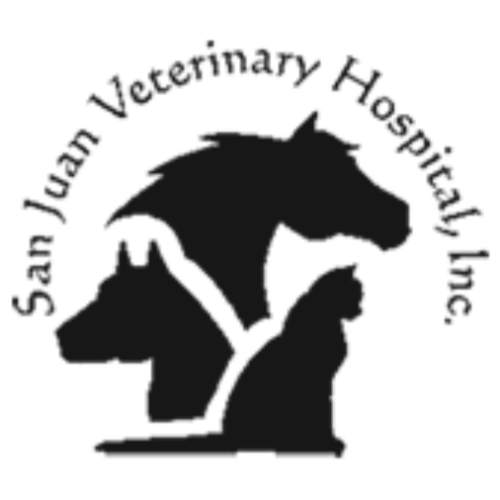FAQs
Our veterinary team has answers to some of your frequently asked questions below!
San Juan Frequently Asked Questions
At San Juan Veterinary Hospital, we get a ton of interesting questions from pet parents. Below are some common FAQs that might help answer any questions or concerns.
What are some safety tips for my pet in the summer?
- Don’t leave your pet in a parked car
- Limit walks to early morning or dusk
- Don’t let pet’s loose in cars, instead place your pet in a harness
- Supervise your pets around water
- Don’t leave your pet outside for too long
- Follow safe firework practices
What are some safety tips to remember during the holidays?
- Put an identification tag on your pet
- Use battery-operated flameless candles
- Wrap cords in cord protectors and leave the bottom half of your tree undecorated
- Keep wrapping materials away from pets
- Create a safe haven for your pet during noisy parties
- Keep these foods away from pets:
- Chocolate
- Raw eggs
- Nuts
- Mistletoe
- Alcoholic beverages
- Cherry or peach pits
- Candy and foods sweetened with xylitol
How do I get rid of skunk smell from my pet?
Recipe to get rid of skunk smell on dogs is as follows:
- ¼ cup of baking soda.
- 1-2 teaspoons of mild dishwashing detergent like Ivory Snow.
- 1 quart of 3% Hydrogen Peroxide solution.
- Mix in a bucket and use immediately.
- Work the foaming mixture well into the coat.
- Leave on for five minutes.
- Rinse with warm water.
- Follow with dog shampoo if desired.
What is Parvo?
Canine parvovirus is a contagious virus mainly affecting dogs. CPV is highly contagious and is spread from dog to dog by direct or indirect contact with their feces. Vaccines can prevent this infection, but mortality can reach 91% in untreated cases. Treatment often involves veterinary hospitalization.
How do I clean my home if my pet has Parvo?
The best and most effective disinfectant against viruses (including parvoviruses) is BLEACH. One part bleach is mixed with 30 parts water and is applied to bowls, floors, surfaces, toys, bedding, and anything contaminated that is colorfast or for which color changes are not important.
Are vaccines important for my pet?
Vaccines are products designed to trigger protective immune responses and prepare the immune system to fight future infections from disease-causing agents. Vaccines stimulate the immune system’s production of antibodies that identify and destroy disease-causing organisms that enter the body.
Vaccines provide immunity against one or several diseases that can lessen the severity or prevent certain diseases altogether.
Experts agree that widespread use of vaccinations within the last century has prevented death and disease in millions of animals. Vaccinations protect your pet from highly contagious and deadly diseases and improve your pet’s overall quality of life.
